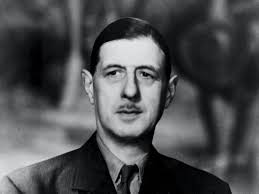De Gaulle tackled France’s loss of self-confidence by speaking for “la France profonde” and insisting that “France cannot be France without grandeur”. France could easily have wallowed in despair after the war or—what amounted to the same thing—listened more enthusiastically to Marxist intellectuals such as Jean-Paul Sartre. De Gaulle regarded national pride as the only cure for national suicide. Johnson has the same life-preserving instincts. He likes to think that he speaks for Middle England. He identifies Britain with “greatness” as naturally as the general identified France with “grandeur”. He is repulsed by the left’s characterisation of Britain’s past as nothing but a story of oppression and exploitation. It is not only factually wrong, in his view: it is also damaging to teach children to be ashamed of their country’s past.
戴高樂通過演講“恒久法蘭西”,并堅持“沒有了偉大,就沒有了法國”,來應對法國的自信心喪失。在戰后,法國本可能很容易陷入絕境,或者說,法國本可能更加熱情地聽從讓-保羅·薩特等馬克思主義知識分子。戴高樂認為民族自豪感是國家自殺的唯一療法。約翰遜也有著同樣的保全國家生命的本能。他喜歡認為在自己是英格蘭中產階級的代表。他認為英國是“偉大的”,這就像戴高樂將軍認為法國是“偉大的”一樣順理成章。左翼人士將英國的過去描繪為一個壓迫和剝削的故事,約翰遜對此感到厭惡。在他看來,這不僅是事實上的錯誤,而且教育孩子們為自己國家的過去感到羞愧也是有害的。

The general looked forward as well as back: he knew that the best way to restore France’s grandeur was not just to talk about it but to revitalise the country.He ushered in the Fifth Republic, turning the state into an instrument of modernisation, creating a new technocratic elite, rationalising government and investing in infrastructure. France enjoyed “les trente glorieuses”, from 1945 to 1975, when GDP grew at an average of 6% a year.
戴高樂將軍既展望未來,也會回顧歷史:他知道恢復法國輝煌的最好辦法,不能僅憑說說,而是要靠振興法國。他建立了法蘭西第五共和國,推進國家走向現代化,創建了新的技術官僚集團,使政府合理化,并投資基礎設施。從1945年到1975年,是法國的“光輝三十年”,期間法國的國內生產總值平均每年增長6%。
Mr Johnson shares some of these instincts. He senses that the old political order is crumbling—hence his bold raid on northern voters. He senses that the Tories need to give a more active role to the state—hence his enthusiasm for big infrastructure projects such as HS2, a new railway, and even HS3 (a high-speed link between Leeds, Manchester and Liverpool). His description of himself as a “Brexity Hezza”—referring to Michael Heseltine, a leading Tory critic of Thatcherism, who believed that the state should take the lead in regenerating poor areas—is almost a way of saying “a Gaullist”. His two closest allies, Michael Gove, the cabinet-office minister, and Dominic Cummings, his chief adviser, want to put reforming the state at the heart of politics.
約翰遜也有同樣的天份。他感覺到舊的政治秩序正在瓦解,因此他大膽爭取北方選民。他感覺到保守黨需要對國家發揮更積極的作用,因此他對大型基礎設施項目充滿熱情,比如HS2工程(一條新鐵路),以及HS3工程(連接利茲、曼徹斯特和利物浦的高速鐵路)。約翰遜將自己描述為“脫歐的赫扎派”——指的是保守黨的一位對撒切爾主義的主要批評者邁克爾·赫賽爾廷,他認為國家應該帶頭復興貧困地區——這幾乎是一種“戴高樂主義者”的說法。約翰遜的兩個最親密的盟友,內閣府部長邁克爾·戈夫和首席顧問多米尼克·卡明斯希望把改革國家置于政治的核心。
譯文由可可原創,僅供學習交流使用,未經許可請勿轉載。












